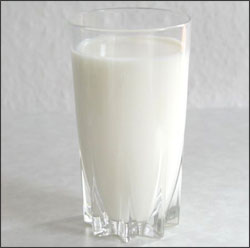Milk Might Transmit Mad Cow Disease
By | Янв 25, 2007

Mad Cow Disease, also known as Bovine Spongiform Encephalopathy (BSE), affects the central nervous system of the cows. The brain loses control and the animal ultimately dies.
A mad cow’s milk may contain these prion proteins and the disease might be transmitted from the mad cow to humans who happen to drink its milk, according to a new study.
It has been proved by earlier studies that body fluids such as blood may carry these infectious proteins. But it was not clear whether milk could carry prions, until the study.
During the current study, Nicola Franscini and colleagues at Case Western University School of Medicine, detected prion protein (PrPC)-the precursor of prions (PrPSc)-in milk from humans, cows, sheep, and goats.
They found prions to be heat-resistant and treatment of infected milk to very high temperature only partially diminished endogenous PrPC concentration.
According to the United States Department of Agriculture, Prions endure all types of environment.
The study declares that drinking the milk of a cow infected with mad cow disease may transmit the disease to the consumers although it is not clear, how serious the risk might be.















